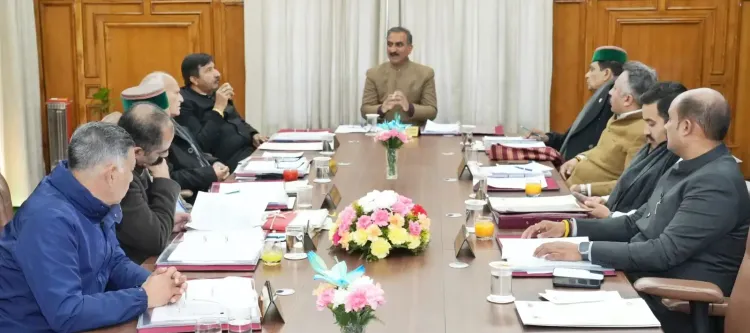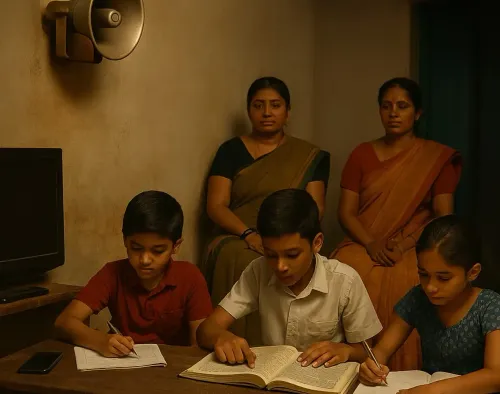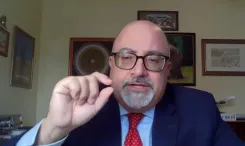Himachal Cabinet Resolutions: STF Established to Combat Drug Issues, 12% Stamp Duty Imposed, Expansion of BPL Beneficiary List

Shimla, Jan 9 (NationPress) The Himachal Pradesh cabinet, presided over by Chief Minister Sukhvinder Sukhu, convened on Thursday and made several crucial decisions, including the formation of a Special Task Force (STF) aimed at dismantling drug trafficking networks, the imposition of a 12% stamp duty on transfer and lease transactions, and an expansion of the BPL Beneficiary list. The cabinet also paid homage to former Prime Minister Dr. Manmohan Singh and held a moment of silence in his honor.
The cabinet sanctioned the addition of families to the BPL list, particularly targeting those with no adult members aged between 18 and 59, families led by women, and those with a head of household who has a disability of 50% or more. It also includes families that have worked for at least 100 days under MGNREGA in the prior fiscal year and those whose earning members are affected by chronic illnesses such as cancer, Alzheimer’s, Parkinson’s, muscular dystrophy, thalassemia, or other conditions leading to permanent disability.
Moreover, the cabinet approved the establishment of the Special Task Force (STF) to address drug abuse and dismantle drug trafficking and organized crime networks statewide through a comprehensive, multi-dimensional strategy.
Additionally, the cabinet resolved to enact an ordinance to modify Schedule 1A of the Indian Stamp Act, 1899. This amendment allows for a uniform stamp duty rate of 12% on transfer and lease transactions governed by Section 118 (2) (H) of the Himachal Pradesh Tenancy and Land Reforms Act, 1972, contingent upon prior approval from the state government.
The cabinet also agreed to prohibit the felling of trees with the exception of safeda, poplar, and bamboo, while regulating the sale of khair according to a ten-year program.
Furthermore, the cabinet approved guidelines for the 'Sarkar Gaon Ke Dwar' program, aimed at addressing the grievances of residents in remote and challenging areas. It reiterated its request to the Government of India to endorse a 90:10 funding formula for the power segment of the Kishau multipurpose project, akin to the formula utilized for the water component. Alternatively, it suggested a 50-year interest-free loan for the total amount owed by the state for the power component under the Inter-State Agreement.
Additionally, the cabinet decided to delegate authority for the allocation and oversight of hydro and solar power projects exceeding 5 MW, alongside green hydrogen, biomass, and pumped storage projects to the Department of Energy.
It also sanctioned the establishment of a one MW green hydrogen project in Nalagarh, located in the Solan district, to be implemented by HPPCL.
Moreover, the cabinet approved the introduction of Green Energy Development Charges for Pumped Storage Projects, imposing a fee of Rs 2.5 lakh per MW annually for the first decade post-commissioning, which will rise to Rs 5 lakh per MW per year thereafter.
The cabinet consented to rename the Himachal Pradesh Institute of Public Administration (HIPA) to Dr. Manmohan Singh Himachal Pradesh Institute of Public Administration.
The cabinet recognized his contributions to the advancement of the nation and Himachal Pradesh. It noted that various significant projects in the state were realized owing to Dr. Singh's foresight and support, such as the Atal Tunnel, three medical colleges, the ESIC Hospital at Ner Chowk, IIT Mandi, IIIT Una, the Central University, and the National Institute of Fashion Technology (NIFT) in Kangra. It was also acknowledged that Dr. Singh's tenure as Prime Minister and Union Finance Minister was transformative. His initiatives like the Right to Information Act, Right to Education Act, MGNREGA, the Food Security Act, the introduction of Aadhaar, Direct Benefit Transfer (DBT), and the landmark loan waiver for 72 lakh farmers were highlighted as significant milestones.
The Indo-US Nuclear Deal during his term as Prime Minister was celebrated as a strategic milestone with long-lasting benefits for India. As Union Finance Minister, Dr. Singh played a crucial role in rescuing the country from an economic crisis and laying the groundwork for economic reforms that transformed India's financial landscape, according to an official statement.










